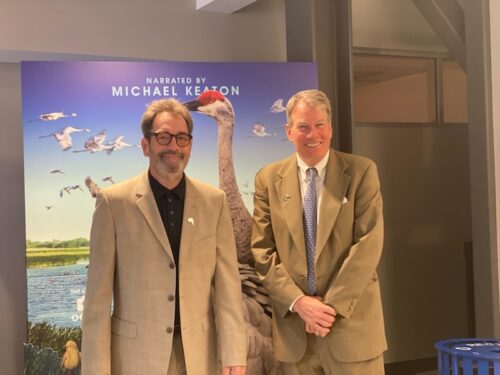Charlie Potter Helps IMAX Movie About the Importance of Prairie Wetlands Take Off
By David A. F. Sweet
A yellow warbler that weighs as little as a few sheets of paper flies 3,000 miles — even traveling over the Gulf of Mexico at night – to arrive in the same spot in the U.S. prairie wetlands as the year before. Given the bird has no mechanical aids like an airplane does, it is miraculous that it – and millions of others, from sandhill cranes to mallard ducks – can achieve this feat again and again.
Unfortunately, the 300,000 square miles of prairie wetlands that stretch through five states from Iowa to Montana and include three Canadian provinces are endangered. That’s where the nationally released IMAX film, Wings Over Water, comes into play.
The joint venture of the Max McGraw Wildlife Foundation, Ducks Unlimited and the National Audubon Society is aimed at alerting the world that these prairie wetlands need to be protected. Aside from wildlife, some 50 million people rely on this ecosystem for clean water.

Charlie Potter gets together with rock star Huey Lewis during a Wings Over Water event in Pittsburgh.
Lake Forest’s Charlie Potter, executive producer of the film and president and CEO of the Max McGraw Wildlife Foundation, notes that the ecological significance for birds and other species of the wetlands remains unequaled in North America. This movie brings that idea to a mainstream audience.
“We think this movie will transform the way conversation is communicated,” Potter said. “Ansel Adams’ photography awakened the world to the West. We’re trying to do that for prairie wetlands with today’s technology.”
The cinematography is so jaw dropping that sometimes it doesn’t seem real. Drones follow flying birds up close as they traverse vast territories. Cinematographers on the ground get closeups.
“They’d start 10 feet away from the birds,” Potter said. “We had to acclimate the birds to our presence. And as the birds got comfortable, we’d go inches away.”
Potter compares these prairie breeding grounds to the importance of the Amazon in South America. Unfortunately, there is not a big push by residents of the five states to save them, as agricultural interests continue to swallow the land. Millions of birds who once nested there have vanished. Ducks Unlimited names the Prairie Wetlands Region No. 1 on the 25 most important and threatened waterfowl habitats on the continent.
How did the idea come for a wildlife group to produce a national movie – one narrated by famous actor Michael Keaton? During a gathering of conservation leaders at Max McGraw in 2018, it was agreed that despite a focus on habitat, there had been a lack of funding for communications. A big effort to reach the public and politicians about the importance of wetlands protection was needed – one that packed a dramatic statement. Lake Forest residents Dick and Liz Uihlein, among other individuals and corporations, signed on to help provide funding for the unprecedented 3D film.
Potter noted he and others are hoping to work with thousands of schools to include the prairie wetlands in their curriculum before they see the film. He also pointed out Wings Over Water is being broken down to 1-2-minute portions so millions of kids can learn lessons about nature involving science, geography and history.
Potter’s love of the outdoor world began as a child. He grew up on a farm in Lake County, and his passion for hunting and fishing emerged at an early age. Aside from his present post at McGraw —
which hopes to ensure the future of hunting, fishing and land management through various programs — he has written for Field & Stream and Outdoor Living magazines and authored the book Following the Flight about his travels along the Mississippi Flyway after he graduated from Northwestern University. Later this year he will publish a second book, A Lifetime In Waders. For a quarter century, he has hosted The Great Outdoors show on WGN Radio.
And as he sees the prairie wetlands – used by about 75 percent of birds on this continent – slowly fade away, he knows Wings Over Water is an amazing vehicle to help change people’s perceptions. Said Potter, “We had state-of-the-art 3D cameras and two of the leading nature cinematographers of all time, Neil Rettig and Andrew Young, and they made magic.”
Unsung Gems Columnist David A. F. Sweet is the author of Three Seconds in Munich. He can be reached at dafsweet@aol.com










